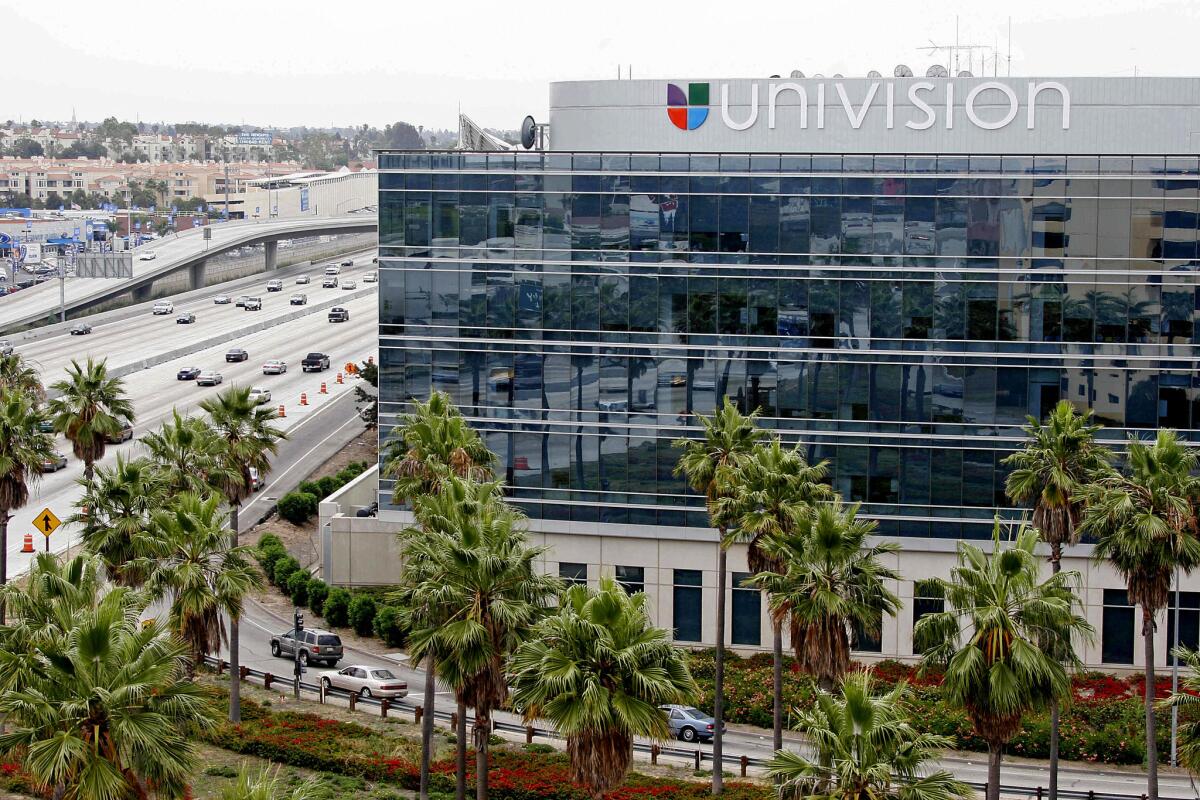Ruling ends Univision’s blackout on Charter’s Spectrum cable service

- Share via
A New York judge on Thursday ended a blackout — at least temporarily — of television networks owned by Univision Communications Inc. on Charter Communications’ cable service.
New York Superior Court Justice Saliann Scarpulla granted Charter’s request for a temporary restraining order against Univision during a hearing in Manhattan.
Charter quickly restored the networks, including Univision’s popular station KMEX-TV Channel 34 in Los Angeles.
The station, and several other Univision channels, had been off Charter’s Spectrum cable service for about 36 hours.
The outage came early Wednesday and affected an estimated 2.5 million Latino homes in the U.S., including tens of thousands of consumers in the Los Angeles area.
Univision is one of the most popular television networks among Spanish-speaking Latinos. In addition to the flagship Univision network, the blackout included the UniMas broadcast network and cable TV channels Galavision, El Rey and Univision Deportes.
Univision had demanded that its channels be taken off Charter’s Spectrum cable system following a months-long dispute over carriage fees. Charter is the largest cable TV provider in Southern California.
Scarpulla’s order that led to the restoration of the channels lasts just seven days — until Feb. 9. It was unclear Thursday whether another judge, who is presiding over the court case between the two companies, will demand that Univision’s channels remain on Charter’s Spectrum service.
“Today, the Supreme Court for the state of New York granted Charter a temporary restraining order, meaning that Univision programming will be returned to our customers,” a Charter spokesperson said in a statement announcing the court victory.
Although squabbles between TV programmers and cable operators are becoming more common, it is highly unusual for a judge to intervene. However, this dispute was already in the courts because Univision filed a lawsuit against Charter contending the Connecticut cable operator was using an illegal maneuver to avoid paying higher programming fees. The case was filed in New York, where Univision is based.
Charter has long maintained that it has a valid contract with Univision, and the Spanish-language media giant had no right to demand that its channels be taken off Charter’s system. Charter is trying to adhere to a contract that Time Warner Cable struck with Univision in 2014. Charter bought Time Warner Cable last year, and has been hoping to pay the lower rates that Time Warner Cable — which was a substantially larger system — had negotiated.
“Univision remains ready and willing to meet at any time with Charter Spectrum to engage in comprehensive, good-faith negotiations for the long-term carriage of our stations and networks,” the company said in a statement. “To date, Charter Spectrum has steadfastly refused to engage in such negotiations.”
The ruckus comes as Charter and other pay-TV operators are struggling to hold the line on programming costs. There are several other blackouts around the country, including one affecting Frontier Communications customers in Seattle and Portland, Ore., who have lost easy access to their ABC-affiliated station, owned by Sinclair Broadcast Group.
In late December a separate standoff ended with detente after media giant NBCUniversal threatened to yank its channels from Charter’s Spectrum service on the eve of a high-profile “Sunday Night Football” game. After NBC’s threat, a new contract was quietly ironed out.
More to Read
Inside the business of entertainment
The Wide Shot brings you news, analysis and insights on everything from streaming wars to production — and what it all means for the future.
You may occasionally receive promotional content from the Los Angeles Times.











